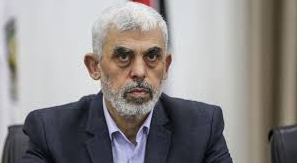
The secretive Hamas chief in Gaza remains elusive as Israel targets his militant group in the wake of last month’s brutal assault
The mastermind behind the deadly Hamas attack on Israel, which ignited the worst violence between the two sides in decades, remains a shadowy and highly feared figure. Yehya Sinwar, the head of Hamas in Gaza, is at the heart of the group’s leadership and is Israel’s most sought-after target. Despite being relentlessly pursued, he remains in hiding and continues to guide Hamas’ military operations.
Sinwar’s role in the October 7 assault on Israel, which killed roughly 1,200 people, mostly civilians, shocked both Israel and the international community. The attack shattered Israel’s perception of invincibility, with Hamas militants exploiting Israel’s vulnerabilities. Sinwar, a highly secretive leader who learned Hebrew while imprisoned by Israel, is a strategist who deeply understands his enemy.
While Sinwar remains a key figure in Hamas’ resistance, his survival and the outcome of the war may depend on the war’s resolution and whether Palestinians feel they have gained something from their sacrifices. The exchange of prisoners between Hamas and Israel, as well as the temporary ceasefire, is seen as a potential political victory for Sinwar, albeit one achieved at great cost.
However, Sinwar’s rise to prominence is rooted in his ruthless leadership style. His political career within Hamas began early, where he earned the nickname “Butcher of Khan Younis” for his harsh approach to suspected collaborators. Even within Hamas, he is a polarising figure — respected for resisting Israel, but feared for his authoritarian rule in Gaza.
Born in 1962 in Gaza’s Khan Younis refugee camp, Sinwar became a key figure in Hamas soon after its inception in 1987. He is known for his brutal methods in combat and for purging Hamas of suspected Israeli spies. After serving years in Israeli prisons, where he became known for his charismatic leadership among fellow detainees, Sinwar was released in 2011 as part of a prisoner exchange deal.
Sinwar’s leadership in Gaza has been marked by his alignment with Iran and Hezbollah, and his ability to direct military operations while consolidating power within Hamas. His rise was not without controversy; he was implicated in internal Hamas power struggles and survived an assassination attempt. Now, as the conflict continues, Sinwar’s survival is increasingly uncertain, yet his influence remains a significant factor in Hamas’ resilience.
Despite Israel’s efforts, the ideology Sinwar nurtured over decades is not so easily eradicated. As one former Israeli security official stated, “We may kill him, but destroying the ideology he represents is another matter entirely.”










